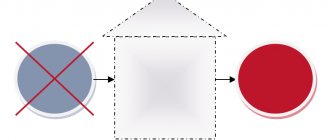When is it necessary to establish the fact of acceptance of an inheritance?
If for some reason the heir was unable to visit the notary's office, but uses the transferred things or real estate on an actual basis, according to the law he is still the new owner of the property. This right is enshrined in Article 1153 of the Civil Code of the Russian Federation.
It is important to note that in this case he can own and use the property, but not dispose of it. Therefore, the urgent need for legal registration arises only when it is necessary to dispose of property, for example, when it is necessary to exchange or sell value. Without a document on ownership, it is impossible to conclude a transaction , that is, a purchase and sale agreement can be signed, but it is not possible to formalize the transfer of ownership from one owner to another. Therefore, there is a growing need to visit the relevant institutions to legally prove your rights.
Conditions of the procedure
The Civil Code of the Russian Federation provides for the right of an heir to accept property transferred from a deceased person or to refuse it. In the first case, the heir has two options: contact a notary and write an application to enter into an inheritance, and then receive a certificate of inheritance, or actually be an heir, without drawing up the relevant documents.
The second method is very dangerous, because other relatives may appear claiming to receive valuables from the previous owner. In addition, an apartment for which the right of inheritance has not been formalized cannot be sold or exchanged. The first option is preferable and safer.
The actual owner of the transferred property has two options to correct the current situation:
- The first is to visit a notary if the period allotted by the state (6 months, according to Article 1154 of the Civil Code of the Russian Federation) has not expired.
- The second is when you have to prove in court your right to extend the allotted period.
Judicial proceedings are envisaged only if the deadline for applying to a notary has expired and a written refusal has been issued. One appeal will not be enough. In court, the plaintiff will be required to prove compelling reasons that led to missing the allotted six-month deadline.
The legislation provides for circumstances in which no initiative has been taken to consolidate formal actions to register property, but, despite this, the citizen considers the property to be his own, and the following facts have been established:
- Monitoring the safety of property.
- Payment of bills from the former owner.
- Maintenance of property at your own expense.
- Use of property for its intended purpose.
Based on the statement of the Plenum of the Supreme Court dated May 29, 2012, number 9, the heir must treat this property as if it were his own.
Sometimes situations occur when the property was jointly owned with the deceased, but the person who became the heir lives in another area or city. In this case, he needs to move into a living space and pay all utility bills, then he will be considered the actual owner.
Actual inheritance cannot be officially recognized in the following cases:
- if there is insufficient evidence of a relationship with the deceased, if there is no will;
- in the case of a will drawn up for another citizen;
- unless evidence of missing the deadline for an important reason is presented to the court.
The court's decision
After listening to the lawyer of citizen “D”, the representative of citizen “N.V.”, witnesses in the case, and assessing the evidence presented, the court found. According to Part 1 of Art. 39 of the RF IC, when dividing the common property of spouses and determining shares in this property, the shares of the spouses are recognized as equal, unless otherwise provided by the agreement between the spouses. According to Art. 1142 heirs of the first priority according to the law are the children, spouse and parents of the testator. In accordance with Art. 1152 of the Civil Code of the Russian Federation, in order to accept an inheritance, the heir must accept it in the manner prescribed by law. According to Article 1153 of the Civil Code of the Russian Federation, acceptance of an inheritance is carried out by submitting, at the place of opening of the inheritance, to a notary or an official authorized in accordance with the law to issue certificates of the right to inheritance, an application from the heir to accept the inheritance or an application from the heir to issue a certificate of the right to inheritance. It is recognized, until otherwise proven, that the heir accepted the inheritance if he performed actions indicating the actual acceptance of the inheritance, in particular, if the heir:
- Entered into possession or management of inherited property;
- Took measures to preserve the inherited property, protect it from encroachments or claims of third parties;
- Has incurred expenses for the maintenance of the inherited property at his own expense;
- Paid the debts of the testator at his own expense or received funds due to the testator from third parties.
At the court hearing, the fact of acceptance of the inheritance by citizen “D” after the death of citizen “N” was confirmed, since she accepted for storage the property belonging to him, namely: a car, personal belongings, paid for the funeral, paid for utilities until 2010 for the disputed apartment, and maintained it and stores his things in this apartment. The other party did not present evidence to the contrary to the court.
Under such circumstances, since citizen “D” actually accepted the inheritance, her demand for recognition of her, as an heir according to the law of the first priority, ownership of a 1/2 share in the disputed apartment is legal, justified and subject to satisfaction. In addition, the requirement to recognize her ownership of a Hyundai Sonata car is also subject to satisfaction, since by virtue of Article 39 of the RF IC, she is the owner of 1/2 of the car purchased during her marriage to citizen “N”, and is also an heir to 1/2 of the testator's share of the car. Thus, the total size of her share is 3/4.
In addition, since citizen “D” has been recognized as having the right of ownership of a 1/2 share in the disputed apartment and the right of ownership of the disputed car, then the certificates of inheritance according to the law issued to citizen “N.V.” notary of Moscow should be declared invalid.
The counterclaim cannot be satisfied. Thus, at the time of privatization of the apartment located at the address: Moscow, Avenue *****, building **/**, apartment **, minor citizen “N.V.” was not registered in the disputed apartment, therefore the agreement on the transfer of ownership of the apartment cannot be declared invalid. In addition, taking into account the testimony of witnesses that citizen “N.V.” actually lived in the disputed apartment, the court found no grounds for declaring the apartment transfer agreement invalid, since the representative of the defendant in the counterclaim stated that the statute of limitations had expired. According to clause 1 of Article 181 of the Civil Code of the Russian Federation, the limitation period for a claim to apply the consequences of the invalidity of a void transaction is three years. The limitation period for the specified claim begins from the day when the execution of this transaction began.
The court considered that the legal representatives of citizen “N.V.”, knowing about the violation of the minor’s rights, should have challenged the deal in court, which was not done. 16 years have passed since the start of execution of the transaction, and the legal representative filed a claim in court in 2012, having missed the statute of limitations. Thus, the court has no legal grounds to satisfy the claim, since the Plaintiff in the counterclaim missed the limitation period and the court was not presented with evidence of valid reasons for missing the limitation period for the stated claims.
Also, the court cannot agree with the requirement to recognize citizen “D.” an unworthy heir, since the court was not presented with evidence that she, through deliberate unlawful actions directed against the testator or against citizen “N.V.”, or against the implementation of the testator’s last will expressed in the will, contributed (tried to) promote the vocation of herself or others persons to inherit or contributed (tried to) facilitate an increase in the share of the inheritance due to them or other persons, if these circumstances are confirmed in court. Also, the court was not presented with indisputable evidence of the seizure by citizen “D” of the funds of the deceased citizen “N”.
Also, the court did not find legal grounds for recognizing citizen “N.V.” priority right to receive the disputed apartment against the inheritance share. According to clause 3 of Article 1168 of the Civil Code of the Russian Federation, if the inheritance includes residential premises (a residential building, apartment, etc.), the division of which in kind is impossible, when dividing the inheritance, the heirs who lived in this residential premises on the day the inheritance was opened and who do not have other residential premises, have, over other heirs who are not the owners of the residential premises included in the inheritance, a priority right to receive this residential premises against their inherited shares.
According to clause 1 of Article 1170 of the Civil Code of the Russian Federation, the disproportion of the inherited property, the priority right to which the heir claims on the basis of Article 1168 or 1169 of the Civil Code of the Russian Federation, with the inheritance share of this heir is eliminated by the transfer by this heir to the remaining heir of other property from the inheritance or by the provision of other compensation , including payment of the appropriate amount of money. According to paragraph 54 of the Resolution of the Plenum of the Supreme Court of the Russian Federation dated May 29, 2012 No. 9 “On judicial practice in inheritance cases,” the court has the right to refuse to satisfy the specified preemptive right, establishing that this compensation is not proportionate compensation for the inheritance shares of the remaining heirs who do not have such a preemptive right, or its provision is not guaranteed.
In connection with the above, the court decided:
- Claims of citizen “D” against citizen “N.V.” on establishing the fact of acceptance of the inheritance, invalidating the certificate of inheritance by law, recognizing the ownership of a 1/2 share of an apartment and the right of ownership of a car.
- To establish the fact that citizen “D” accepted the inheritance that opened after the death of citizen “N”.
- Invalidate the “N.V.” issued to a citizen Notary of Moscow, certificate of right to inheritance according to the law dated 07/09/2010.
- Invalidate the “N.V.” issued to a citizen and about. Moscow notary certificate of the right to inheritance according to the law dated March 30, 2010.
- Recognize for citizen “D” the right of ownership of a 1/2 share of an apartment located at the address: Moscow, Avenue *****, building **/**, apartment ** by way of inheritance by law after the death of citizen “N” , the remaining 1/2 share in the apartment is recognized as belonging to citizen “N.V.”
- Recognize citizen "D"'s right of ownership of a Hyundai Sonata brand car, state number *******, by way of inheritance by law after the death of citizen "N".
- To recover from citizen “D” in favor of citizen “N.V.” compensation for 1/4 share in the car in the amount of ** thousand *** rubles ** kopecks.
The decision is the basis for registering ownership of a 1/2 share in an apartment located at the address: Moscow, Avenue *****, building **/**, apartment ** for citizen “D” and 1/2 share in an apartment located at the address: Moscow, Avenue *****, building **/**, apartment ** behind citizen “N.V.”
Counterclaim by citizen “N.V.” to citizen “D” leave without satisfaction.
Algorithm of actions
The standard procedure involves the following algorithm of actions:
- The actual heir is required to contact a notary office within 6 months from the date of death of the testator. This rule is established by Article 1154 of the Civil Code of the Russian Federation.
- The notary will require the following documents:
- passports;
- death certificate of the owner;
- a document confirming the relationship between the applicant and the deceased.
- A notary specialist will check the existence of a will, provided for in Article 1120 of the Civil Code of the Russian Federation, if there is one, and if the applicant is not indicated in it, then he will be refused to accept the inheritance. If it is indicated, a date will be set for receiving a certificate of inheritance.
- The applicant will be required to apply for inheritance, written in writing in the notary's office and according to the established template.
- On the appointed day, the actual owner of the inheritance will receive a certificate of title to the inherited property, with which he will then go to the registration chamber to receive a document of ownership.
Often the evidence seems insufficient to the notary, and you have to prove the fact of acceptance of the inheritance in court. We talked about how to file a lawsuit for inheritance here.
Pre-trial regulation
If the time provided by the state has run out, then the actual heir will have to find all other applicants for receiving the property of the deceased person and obtain written permission from them in the presence of a notary.
If at least one of the relatives who are counting on valuables from a deceased relative does not agree to sign their consent, then they will have to go to court, because without their consent the notary will not issue a certificate.
Going to court
Cases concerning inheritance rights are decided in a court of general jurisdiction, that is, in a city or district court. Cases are considered in special proceedings. Before submitting an application with claims, you must make sure that there are no other relatives claiming the same property. If there are no disputes between the heirs, then you can file a claim to establish the fact of acceptance of the inheritance in court.
If disputes between the heirs exist, then the case will be considered in a claim rather than in a special proceeding.
Formalization of a claim implies the existence of demands , but in special proceedings they write a statement where one can only ask for recognition of the right of actual inheritance.
Most often, an interested person applies, that is, a relative who has actually entered into inheritance rights, but sometimes other persons also do this. This procedure is often undertaken by the heirs of the actual heirs, who wish to receive property legally after his death.
Proof
For the court, it is necessary to provide comprehensive documentation confirming the fact of acceptance of the inheritance. Such documents include:
- utility bills;
- if we are talking about a car, then coupons confirming the repair and maintenance of the vehicle;
- a certificate stating that the citizen lived with the deceased heir;
- confirmation of restoration of things.
For reliability, you can invite witnesses who can confirm the care of the transferred item or real estate. However, testimony alone will not be enough, since a documentary base is needed. Extension of the period for good reason is provided for in Article 1155 of the Civil Code of the Russian Federation.
Drawing up a statement of claim
The statement of claim for acceptance of inheritance is drawn up competently and clearly without unnecessary deviations. It is recommended to involve an experienced lawyer in its preparation, who will be able to formulate the thoughts of the person applying.
- The application begins with the name of the judicial authority to which the application is made.
- Next, you need to indicate your initials and residential address.
- The next step is to describe the arguments in favor of the property owned.
- At the end of the claim, provide photocopies of certificates and other evidence.
How to confirm the actual entry into inheritance in 2021
After the court makes a positive decision on the applicant’s claim:
- A judicial act is issued as the basis for applying to a notary to obtain a certificate of ownership;
- In the process of obtaining the document, it will be necessary to pay a state fee in the amount established by law;
- You must make an entry about your rights in the registration registers.
In this case, the notary is obliged to issue a certificate only on the basis of a judicial act without requesting additional documents. After establishing the fact of inheritance in court and receiving the relevant documents, you will be able to dispose of the property at your own discretion.
In order for the issue to be resolved quickly and without problems, it is better to use the services of professionals from our legal group “MIP” during the entire process.
First of all, it is necessary to prepare written evidence within the prescribed period. Then you need to contact a notary to obtain a certificate of inheritance.
Documentary evidence may include:
- rental agreements;
- certificates from housing maintenance organizations or local government bodies or internal affairs bodies about the cohabitation of the successor with the testator on the date of the death of the latter, about the residence of the heir in the inherited residential premises;
- a copy of the heir's statement of claim to the persons who have unjustifiably taken possession of the inherited property for the issuance of this property, with a court's note on the acceptance of the case for proceedings, as well as a court ruling regarding the suspension of the issuance of a certificate of the right to inheritance;
- receipts for repayment of credit debt;
- contracts for repairs in an apartment or house and more.
If evidence is presented, the citizen has the right to apply for a certificate when he considers it necessary. An application for the issuance of a certificate is submitted to the notary at the place where the case was opened, along with the above documents.
If recognition of the fact of acceptance of the inheritance is impossible, you need to ask a notary specialist to issue a certificate of refusal to issue a certificate indicating the reasons, and then go to court.
Initially, an application must be submitted to the court with a request to establish the fact that the inherited property has been accepted. After the claim is satisfied by the court, you need to submit a set of documents to the notary.
Having received judicial confirmation of the acceptance of property assets in fact, the notary draws up a certificate.
To exercise the right to enter into an inheritance, an application is submitted to establish the fact of its acceptance.
However, there are cases when the testator actually accepted the inheritance, but did not formalize it properly. Such an heir needs to formalize the legal right to the property through the court.
The requirement to recognize the fact of inheritance is considered by the court in a special proceeding. However, if a dispute arises between successors regarding the right of inheritance, the procedure for legal proceedings is provided.
In practice, quite often claims are left without progress due to the provision of only copies of documents confirming the fact that the testator owns the disputed living space - such court actions are illegal.
Controversial situations arise when there are several heirs in the case and the right to property is divided between them.
Problems may arise from providing copies of documents to the court without the originals or raising doubts about the authenticity of the papers.
For each specific case, the list of required documents may vary. If any information or documents are missing, or there are errors in them, then in court it will be necessary to establish the fact of the applicant’s relationship with the testator.
When there are no interested parties in the case, such problems in establishing the fact of acceptance of the inheritance are resolved by involving the Federal Tax Service at the place of residence of the deceased citizen.
The successor who has performed actions indicating acceptance of the inheritance has the right to prove the absence of his intention to accept it. Non-acceptance of an inheritance may be caused by the heir’s refusal of the inherited property, his serious illness or other reasons.
In essence, this is a factual situation in which the subject called to inherit does not show interest in the opened inheritance within the established period: does not submit an application to accept or renounce the property, and does not perform the corresponding actual actions.
The question of how to establish the fact of non-acceptance of the inheritance by the legal successor can be resolved by another interested heir. In accordance with Art. 1154 of the Civil Code of the Russian Federation, it is possible to prove the absence of intention to accept property even after the expiration of the period established by law. To do this, you need to contact a notary or the court with a statement to establish the fact of non-acceptance of the inheritance.
If there is evidence of inaction in terms of accepting property assets, the judicial authority establishes the fact of non-acceptance of the inheritance and decides whether to satisfy or reject the claim.
Deadlines for consideration and execution of cases
After filing a claim, all documents and the application itself will be checked within five days. If everything is in order with the documents, then a court date will be set.
It is difficult to say how long the review will take, because to a large extent this factor depends on the amount of evidence and on the behavior of all participants in the process.
In courts of general jurisdiction, the decision made will gain force after the expiration of a period of 10 days . This period is established for filing an appeal to a higher court by all persons interested in this issue.
State duty and expenses for legal services
Unlike a notary's office, the state fee through the court differs in that its cost is not affected by the family ties of the deceased person and the heir. The state duty when going to court depends on the value of the inherited property, as established by Article 333 of the Tax Code of the Russian Federation.
Cost calculations are carried out by both public and private appraisal companies.
The maximum amount of financial resources that can be taken for consideration of a claim is 60 thousand rubles. The minimum threshold is set at 400 rubles.
In addition to the state fee, the actual heir of the property is recommended to use the assistance of a lawyer involved in drawing up the statement of claim. He will be able to control the proper preparation and submission of the document to the judicial authority.
The lawyer will be able to defend the interests of the plaintiff in court and will help to collect all the necessary documents; his services will also have to be paid for.
For many heirs, these payments are important because not everyone understands the legal aspects, and the help of a qualified specialist is necessary.
If you do not agree with the court's decision
If one of the participants in the trial is dissatisfied with the court’s decision, in accordance with Article 320 of the Code of Civil Procedure of the Russian Federation, he has the opportunity to challenge it within a specified period until the decision enters into legal force. To do this, you need to file an appeal to a higher court.
We recommend that you read other materials on the topic of document preparation. From them you will learn how to file a claim for recognition of property rights by inheritance and draw up a power of attorney for registration of inheritance.
The use of the property of a deceased person must be lawful. The actual acceptance of the inheritance must be confirmed by documents. This will protect the owner of the transferred property from persons encroaching on it, and this document will also allow you to dispose of the property at your own discretion.
Entering into inheritance through the court, how to file a claim
If the estate does not include real estate, then such an application is submitted to the district court at the place of residence of the applicant (Article 266 of the Code of Civil Procedure of the Russian Federation).
If the inheritance includes real estate, then the rules on exclusive jurisdiction are applied and the application is submitted at the location of the real estate (Article 30, 266 of the Code of Civil Procedure of the Russian Federation).
Summarize:
- An application to establish the fact of acceptance of the inheritance, if there is no real estate, is submitted to the court at the place of residence of the applicant.
- An application to establish the actual acceptance of an inheritance that includes real estate is filed with the court at the location of the real estate.
- 1. Drawing up the necessary document (application or claim).
- 2. Submitting documents to the court.
- 3. Participation in legal proceedings.
- 4. Presentation or request of evidence.
- 5. Participation in judicial debates.
- 6. Obtaining a court decision.
If the court makes a decision not in your favor, then you have the right to appeal it to the appellate authority. The period for appeal is 1 month from the date of drawing up the reasoned part of the decision.
A statement that you have actually entered into an inheritance can be submitted to both the district and city judicial authorities. But all this must be done at the place of permanent residence of the heir. When the list of all premises includes real estate, the paper should be sent to the location of the future inherited housing. If several objects that are located in different places are taken into account at once, then the application is submitted either at the place of registration or at the location of the property.
In many situations of judicial practice, a positive decision is made if there are no aggravating circumstances. But it has a huge number of difficult cases, the decision for which is made in completely different ways. It all depends on the circumstances of each individual case.
IMPORTANT !!! In many cases, satisfaction occurs when the legal deadline has not expired. Problems may begin with people who have the right to accept an inheritance, but do not do so. This can happen when there is no confirmation of actual entry. After death, it is necessary to establish the fact of acceptance of inherited property.
Sometimes this is difficult only because the statute of limitations has already expired. Often difficulties can also arise in a situation where one of the heirs has assumed legal rights, but others have not, and subsequently tried to carry out this procedure.
In any case, difficulties may arise and should be feared. To do this, submit all documents on time and do not be late with registration.
- Labor law How to prove that your dismissal was forced?
- How can you prove your work experience in court to receive a pension?
- What to do if the employer unilaterally fired without warning
- Is it possible to lay off an employee who is the sole breadwinner of the family?
- Can an employer force you to go on vacation?
- How to calculate compensation for unused vacation upon dismissal?
- Is it permissible to fire a woman on maternity leave?
- Can an employer refuse leave at his own expense?
- Wage arrears: how to collect debt
- What to do if your salary is delayed at work and how to write a complaint?
- Family law
- Inheritance law
- Land law
- Labor law
- Automobile law
- Criminal law
- Real estate
- Finance
- Taxes
- Privileges
- Mortgage
During the consideration of the case, it turned out that, secret from citizen “D,” the legal representative of the minor “N.V.” registered through a notary the inheritance left after the death of citizen “N” for a minor. At the same time, information was hidden from the notary that the deceased was married and his wife also claims to inherit. Lawyer M.I. Polyak, after consulting with the principal, citizen “D,” prepared an updated statement of claim, in which she indicated that the new guardian of the minor citizen “N.V.” a Hyundai Sonata brand car, state number ******* and the disputed apartment were secretly from citizen “D” registered in the name of citizen “N.V.”, as evidenced by the corresponding certificates of the right to inheritance under the law from 07/09/2010. When registering ownership of the specified property, information was hidden from the notary that the son of the late citizen “N.” is not the only heir of the first stage, information was not provided about the wife of the deceased - citizen “D”, who is the Plaintiff in the case, who kept the car in a paid parking lot and who had all the documents for the car. In addition, the notary did not clarify the fact that the car was purchased during marriage and is the joint property of the deceased and citizen “D”. The notary also did not clarify the information that after the death of her husband, citizen “D” lived in the disputed apartment and paid utility bills.
In the amended statement of claim, the lawyer indicated that the notary did not take into account the provisions of Article 1168 of the Civil Code of the Russian Federation, according to which the heir, who together with the testator had the right of common ownership of an indivisible thing (Article 133), a share in the right to which is included in the inheritance, has upon division inheritance the preferential right to receive, on account of their inheritance share, things that were in common ownership over heirs who were not previously participants in the common property, regardless of whether they used this thing or not. The plaintiff has the right to 1/2 of the car, since the car was purchased during marriage, but the funds are jointly acquired.
If a citizen did not have time to submit documents for an inheritance for a good reason, then he can safely go to court and defend his position. If the judge considers the arguments presented to be compelling, then the plaintiff will be allowed to enter into inheritance rights retroactively.
Judicial practice on restoring the period for accepting an inheritance suggests several valid reasons:
- The successor was not aware of the death of the testator, which is why he did not contact the notary.
- At the time of the testator's death, the heir was a minor and did not know about his rights. In this case, the representative of the successor had to submit documents to enter into the inheritance.
- The relative of the deceased did not know that the latter had property. Therefore, he decided not to contact a notary.
- The reason for missing deadlines is deception and deliberate misrepresentation. In particular, a citizen could receive incorrect information about the date of death of a relative.
- The heir was seriously ill, was undergoing treatment in a medical institution, and therefore physically could not submit documents.
- At the time of the death of the testator, the successor was abroad and was not able to return within the prescribed period.
- During the period allotted for accepting the inheritance, the successor was in prison, unable to contact a notary's office.
The current legislation does not clearly define valid reasons for missing the deadline for entering into an inheritance. The above-described grounds were formed from general judicial practice. Each case is considered individually, and success depends on the position of the plaintiff, who must correctly argue the reasons for the violation of deadlines, presenting to the court evidence of his words.
The plaintiff's action algorithm:
- Preparation of documents.
- Filing an application or claim.
- Participation in legal proceedings.
- Providing all necessary evidence.
- Participation in judicial debates.
- Obtaining a court decision.
If the court rejects the claims, the plaintiff can appeal the decision through the appeal procedure. 1 month to prepare your complaint . The countdown begins from the moment the court decision is announced.
The decision in favor of the plaintiff can be appealed by the participants in the trial. If the appeal is not received within 1 month , then the court decision gains force. After which the heir can register ownership.






